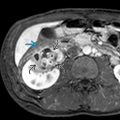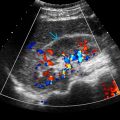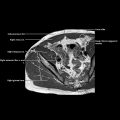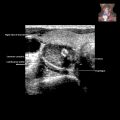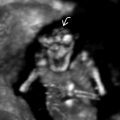KEY FACTS
Terminology
- •
Abnormal accumulation of fluid in 2 sites (pleural, pericardial, ascites, skin)
Imaging
- •
Pleural effusion surrounds lung, which floats toward hilum: Angel wing sign
- •
Large pericardial effusion surrounds heart, displaces lungs to chest wall
- •
Polyhydramnios, placentomegaly may be seen but do not count toward areas of excess fluid accumulation
Scanning Tips
- •
Look for structural abnormalities: Hydrops may be due to chromosomal abnormality, infection, vascular malformation, skeletal dysplasia
- •
Do not confuse hypoechoic abdominal wall muscles with small volume of ascites
- •
Do not confuse hypoechoic, compacted peripheral myocardium with pericardial effusion
- ○
Myocardium ends at valves, effusion surround atria as well as ventricles
- ○
- •
Check cardiac rate and rhythm
- ○
Place M-mode cursor through 1 atrium/1 ventricle to assess atrioventricular conduction
- ○
Apparently isolated ascites may be sign of impending hydrops in fetus with tachycardia
- ○
- •
In any fetus with hydrops, measure middle cerebral artery (MCA) peak systolic velocity (PSV)
- ○
MCA PSV increases with fetal anemia
- ○
Anemia is treatable cause of hydrops
- ○
- •
Scan technique is critical for measurement of MCA PSV
- ○
Small sample volume placed within 2 mm of takeoff of MCA from circle of Willis
- ○
Angle of insonation must be 0, fetus at rest
- ○
Measure PSV and plot multiples of median for gestational age (> 1.5 indicates fetal anemia)
- ○


